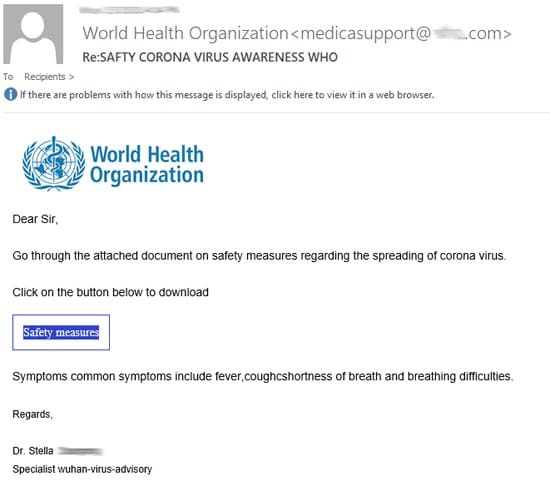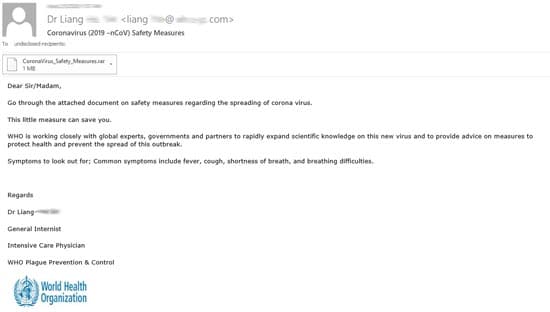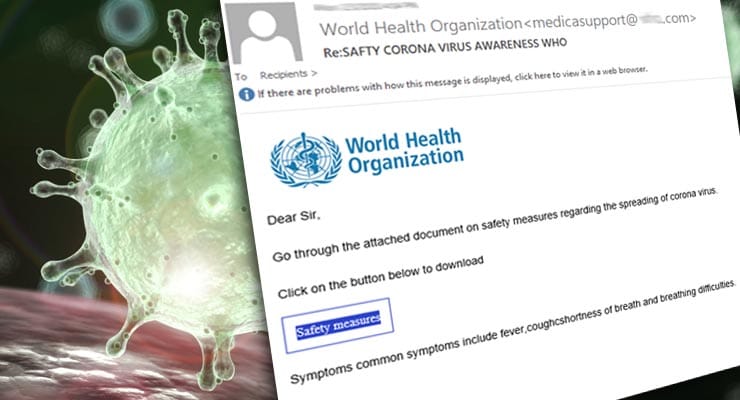Email scams are exploiting coronavirus to install malware
A number of scam emails are being circulated that purport to offer advice or important information on avoiding the coronavirus in a bid to trick email recipients into opening dangerous email attachments or visiting malicious websites.
A number of differently worded emails are circulating, many of which are claiming to provide important “safety measures” or guidance to help protect the public against the spreading coronavirus. For example the below email has been spreading in early 2020.

Dear Sir,
Go through the attached document on safety measures regarding the spreading of corona virus. This little measure can save you.
Use the link below to download.
Safety Measures.pdf
Symptoms Common symptoms include fever, cough, shortness of breath, and breathing difficulties.
Regards
Such emails, like the one above, can contain valid information about coronavirus to make them appear more convincing. However the link leads to a dangerous payload that once downloaded will install malware onto a victim’s device.
Other examples of these scams can be seen below.


Such emails may appear to come from trusted entities such as the World Health Organisation.
Such schemes are likely to try and install malware such as spyware or strains of ransomware which can prevent you accessing important files on your computer until you pay money for a decryption key.
We recommend getting your advice concerning coronavirus from trusted outlets, such as the website of the World Health Organisation or from bodies such as the UK’s National Health Service (NHS) or the USA’s Centers for Disease Control and Prevention (CDC.)
Sponsored Content. Continued below...
Malware scammers frequently use national headlines and seasonal events to infect victims. For example, scammers often exploit tax deadlines to trick victim’s into clicking malicious phishing links or opening malicious email attachments.
And headlines like coronavirus offer the perfect bait for scaremongering emails designed to alarm and panic recipients, which increases the likelihood that they will compromise their own security by opening attachments or clicking links.
We recommend ignoring and deleting any unsolicited emails pertaining to coronavirus, especially if they request you click links or open attachments. Any advice or directions you need about it can be obtained from the websites of the aforementioned entities.
Keep up-to-date with all the latest cybersecurity threats and our tips to stay safe online. Follow us on Facebook, Instagram and Twitter.
Continued below...
Thanks for reading! But before you go… as part of our latest series of articles on how to earn a little extra cash using the Internet (without getting scammed) we have been looking into how you can earn gift vouchers (like Amazon vouchers) using reward-per-action websites such as SwagBucks. If you are interested we even have our own sign-up code to get you started. Want to learn more? We discuss it here. (Or you can just sign-up here and use code Nonsense70SB when registering.)
Become a Facebook Supporter. For 0.99p (~$1.30) a month you can become a Facebook fan, meaning you get an optional Supporter Badge when you comment on our Facebook posts, as well as discounts on our merchandise. You can subscribe here (cancel anytime.)
